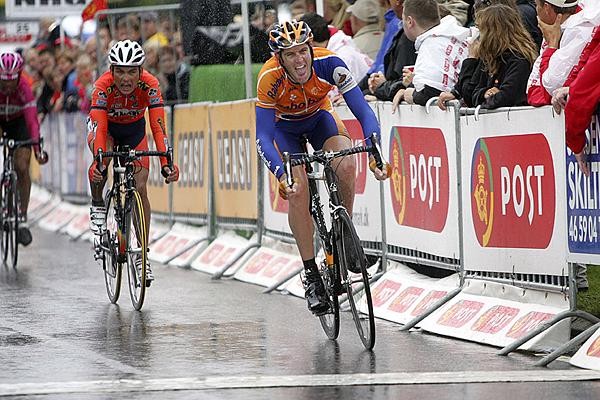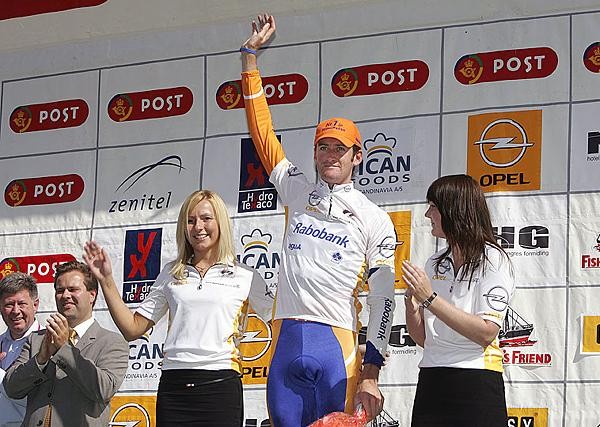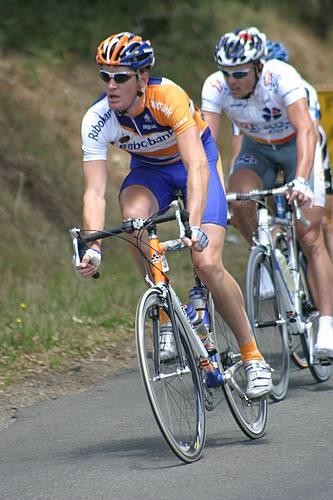Rory's Story
With a number of high profile doping cases recently being awarded, including that of former Phonak...



An interview with Rory Sutherland, March 14, 2006
With a number of high profile doping cases recently being awarded, including that of former Phonak rider Tyler Hamilton, the cycling public - and public in general - may be starting to assume an convicted cyclist is guilty until proven otherwise. However, as the case of young Australian rider Rory Sutherland demonstrates, these lines are not so clear cut.
Although advised not to engage with the media, the 24 year-old from Canberra chose to respond to an invitation from Cyclingnews' Anthony Tan to hear his story.
On December 21 last year, the 24 year-old from Canberra was dealt a career-threatening blow. He tested positive for a little-known drug called Clomiphene - practically unheard of in endurance sports and not expected to produce any performance enhancing effect according to some medical experts, although it is on WADA's banned list because it can inhibit estrogen, thereby increasing the body's testosterone production. Regardless, the disciplinary committee of the Belgian Cycling Federation (with whom he holds his racing licence) chose to suspend the then 23 year-old for two years with a nine-month conditional sentence.
When contacted by Cyclingnews soon after the news broke, Sutherland claims he had no prior knowledge of the substance until he was told it was present in his body at the time he was tested, which occurred at the Deutschland Tour (Tour of Germany) in August 2005. Evidence reveals the concentration of Clomiphene in his body was in the range of 5-10 nanograms - in other words, 5-10 billionths of a gram - and it was this argument that was put forward to the disciplinary committee at his November 23 hearing.
Furthermore, an independent investigation committee wrote in its report that it did not find "any indication that Sutherland was directly or indirectly implicated in expressing interest in or in using substances classified as doping agents" and that "Sutherland took the substance unknowingly."
Now sitting at his home in Canberra, supported by family and friends, Sutherland isn't too sure what to do. Should he appeal to the sport's highest authority, the Court of Arbitration for Sport (CAS)?
The latest race content, interviews, features, reviews and expert buying guides, direct to your inbox!
"This is a very difficult question for me to answer," he says.
"It is on one hand difficult for me to think about going to the CAS after what has just happened to Danilo Hondo. [Upon appeal to the CAS for testing positive to the drug Carphedon, the German rider's suspension was in fact extended from one to two years, as well as another two-year ban from racing in the ProTour - ed.] I wasn't in the courtroom, so I'm not going to speculate on his case. But, for me to run the risk of getting a longer suspension is a very big deterrent. On the other hand, I don't think what has happened is right, and I am not someone who likes just to give up the fight when you know there is an injustice. A bit of a 'Catch 22' situation."
Sutherland's suspension effectively ends on December 15th, 2006, so admittedly, a year and a half out of the sport for a young rider with plenty of promise is unlikely to be career ending. He says he's been given a date when he's permitted to race again, and "I'm looking to that date, and working towards it."
"I've had some time off the bike of late, but have been keeping fit doing other things. It's nearly time to start training again and start working on the future instead of thinking too much about the past. I have no expectation of not riding again. I think in the long run this will help me to realize just how much I really do love the sport. I'm motivated, frustrated, and confident that I will be a better rider from it.
"This is by far the hardest thing I have ever been through. But, it's very important to me that I can hold my head up high in the knowledge that I have never knowingly taken any performance enhancing substances."
Adds Sutherland, who chose to answer the following questions in his own time rather than via phone or face-to-face: "I'm sure a lot of people have made up their minds about me, and to be honest I'm okay with that. Maybe it's not in my best interests to write this, but I think it's important for people to see things from a different angle, and other riders (athletes) can see what can happen in professional sport."
Cyclingnews: What was your initial reaction following the decision made by the disciplinary committee of the Belgian cycling federation, who gave you the 15-month suspension? What are your feelings now?
Rory Sutherland: Well, I'm still obviously quite shocked! I didn't have the expectation of just getting a slap on the wrist, but to be given the same sentence as someone who admits to blood doping, is a major shock.
CN: Let's go back to the start of your neo-professional year with Rabobank. What were your primary objectives?
RS: In 2005, I just wanted to learn as much as possible. And that's what I did the entire year. I raced hard, did my best for my team, and had fun!
CN: It was pretty much a dream run until this happened - second in the Australian time trial championship, a solid spring including the chance to compete and be competitive in races like Gent-Wevelgem, and a place on the final podium at the Tour of Denmark, where you also finished as best young rider. Were you ever thinking, 'it's too good to be true'?
RS: I have improved consistently over the last 3-4 years, so I wouldn't exactly say it was a dream run, or too good to be true! If you're training right, you're motivated and have confidence, there is an awful lot that you can achieve in sport.
CN: The positive sample in question was taken at this year's Deutschland Tour, which followed the Tour of Denmark. You didn't manage to post any significant result, although you were reasonably active on a number of stages. Which stage were you tested, and were you a little surprised to be asked?
RS: I had a random test at the finish of the last stage of the Deutschland Tour. In this day and age, I don't think it's a surprise to be tested. Ask any pro cyclist and they will tell you that they are tested at least 10 times per year. I had a few random tests last year, along with the normal UCI blood tests that are carried out quarterly.
CN: When your A sample was announced as positive on September 17, what were your thoughts? Were you informed of the nature of the substance back then?
RS: I was informed by the Belgian Cycling Federation as per the normal procedure. Thoughts... there was so much going through my head as I read the letter. I guess a huge feeling of disbelief and confusion was the main thing. The letter mainly just listed the name of the substance. Imagine getting a letter saying there is a product which you had never heard of before in your system. Worse still, it's a product that is on the doping list!
CN: You knew the UCI doping laboratories were working on testing the B sample in the meantime, so what action did you take in the following two weeks, if any?
RS: Even under the circumstances, it was important that I made intelligent decisions regarding my test results. I had meetings with the team to discuss everything and came back to Australia to spend time with my family and friends. Once the ball was rolling, unfortunately it was just a waiting game. But I did do as much research as possible into what the product was, and talked to people who are a lot more knowledgeable than me.
CN: On October 6, when the B sample also returned positive for what we now know as Clomiphene, you were dismissed by Rabobank. The action taken is in accordance with the team's anti-doping policy and according to the ProTour ethical charter, but still, did it surprise you - after all, Rabobank announced their own, independent investigation as to what happened not long after your A sample returned positive?
RS: From the first day I have had full contact with Rabobank, and most decisions were made in consultation with the team. I am fully aware of the ethical charter of the Pro Tour, and also of the clauses in my contract. Rabobank followed those rules, and I fully support that.
'We' made the decision together. It was important for myself, and the team, to bring it out in the press ourselves. It is, of course, very distressing being let go from a team who you have so much respect for. One of the reasons for riding for Rabobank is that they are known as a clean team.
There weren't any so-called surprises from the team, they have done everything according to the rules and I have to respect that.
CN: Had you heard of the drug Clomiphene and its intended/ unintended purposes before you were notified of testing positive to the substance?
RS: To be honest, I'm still learning about the substance. And I'm on my way to becoming an expert on it considering how much info I've looked up and read! I'm yet to find scientific research (and a lot of experts are yet to find any scientific link, for that matter) that proves this product has any performance enhancing effect in men.
CN: When presenting your case, what were your main points of argument as to why you believed the decision should be overturned?
RS: I never expected the decision to be overturned. But that doesn't mean I don't think it should be.
The arguments put forward in presenting my case were related to the concentration of the substance, the result of Rabobank's internal investigation, and the possible effect of the product within endurance sport.
CN: At that time, did you believe the judging board properly understood those points? How confident were you of a positive outcome?
RS: I had full confidence in my lawyers. My beliefs were that a realistic person, with the information and results we had supplied, would make an intelligent, calculated and fair decision.
CN: You indicated the concentration of Clomiphene in your body was in the range of 5-10 nanograms, in other words, 5-10 billionths of a gram. The scientists you employed proved that such a concentration is non-performance enhancing, but were they also able to prove that it could have come from anywhere, such as a contaminated sports supplement, or that trace amounts can be found in commonly-eaten foods?
RS: If I knew where it came from I would be in a lot better position than I am in now! If I could test everything I ate and drank within the weeks before and during the tour of Germany, I would. But that's just not realistic, is it? When I think about how small 5-10 billionths of a gram is, and how that is supposed to be performance enhancing, it knocks me off my feet. It also isn't just the concentration in my system that has been proved to be non-enhancing, it's yet to be proved that it is performance enhancing at any concentration. What also scares me is that I will probably never know how Clomiphene got into my system.
CN: This case is not dissimilar to that of Scott Moninger, who said of position of the doping authorities: "In their mind, failing a drug test is failing a drug test, there is no grey area, and I don't agree with that." Are you of the same opinion? If so, do you believe WADA should introduce cut-off levels for certain types of prohibited substances that have 1.) been proven to be unknowingly ingested and 2.) exist in trace amounts so small they are of no benefit to an athlete?
RS: I think Scott's and my cases are very different. When you're talking about different products in different categories, it's a whole different ball game. I'm not going to verbally attack WADA, or the UCI, but I think we are along way off narrowing the net to actually catch the people who knowingly take performance enhancing products. And that makes me question how many athletes have been caught up in the same situation that I'm in – by unknowingly having taken a prohibited substance. Professional sport is hard enough without having to deal with situations which could have been avoided. The rules seem to me to be a closed book, there doesn't seem to be any leniency due to certain situations.
CN: The disciplinary committee delayed their verdict from your November 23 hearing by a month. Do you have any idea why?
RS: I don't really know. I've never been in this situation before, so I'm not sure what the 'normal' time frame is.
CN: Are you able to say whether you will be taking further action, in terms of lodging an appeal with the Court of Arbitration for Sport (CAS)?
RS: This is a very difficult question for me to answer. It is on one hand difficult for me to think about going to the CAS after what has just happened to Danilo Hondo. I wasn't in the courtroom so I'm not going to speculate on his case. But, for me to run the risk of getting a longer suspension is a very big deterrent. On the other hand, I don't think what has happened is right, and I am not someone who likes just to give up the fight when you know there is an injustice. A bit of a 'Catch 22' situation.
CN: Generally speaking, do you know if the CAS view an athlete's case different to that of a disciplinary committee from a national cycling/ sporting federation?
RS: I'm not aware of how the CAS looks at cases, so I can't really comment on that.
CN: If you appeal, a final decision may not be known for some time. What will you do now - stay in Canberra and keep training?
RS: At the moment I have been given a date when I am 'allowed' to race again. I'm looking to that date, and working towards it. I've had some time off the bike of late, but have been keeping fit doing other things. It's nearly time to start training again and start working on the future instead of thinking too much about the past. I have no expectation of not riding again. I think in the long run this will help me to realize just how much I really do love the sport. I'm motivated, frustrated, and confident that I will be a better rider from it.
This is by far the hardest thing I have ever been through. But, it's very important to me that I can hold my head up high in the knowledge that I have never knowingly taken any performance enhancing substances.
I'm sure a lot of people have made up their minds about me, and to be honest I'm okay with that. Maybe it's not in my best interests to write this interview, but I think it's important for people to see things from a different angle, and other riders (athletes) can see what can happen in professional sport.
A lot of bad things happen in the world. If this is as bad as my life gets, then I'll have a pretty good life! I just try to put things into perspective and work from that.
Editor's note: Following this interview, Sutherland wrote about his appeal prospects: "The window of appeal for myself has closed. Due to advice, I have chosen not to run the risk of an extended suspension.
"Regarding the UCI and WADA, they also have grounds to appeal the decision of the Belgian Cycling Federation and take it further if they wish (i.e., if they find the repremand too light, etc.). Their time window has also ended, so it's case closed."
